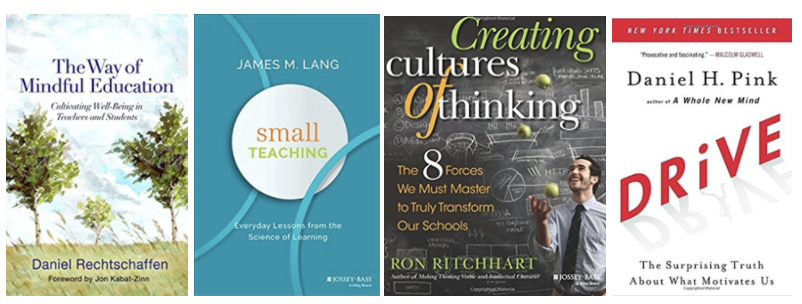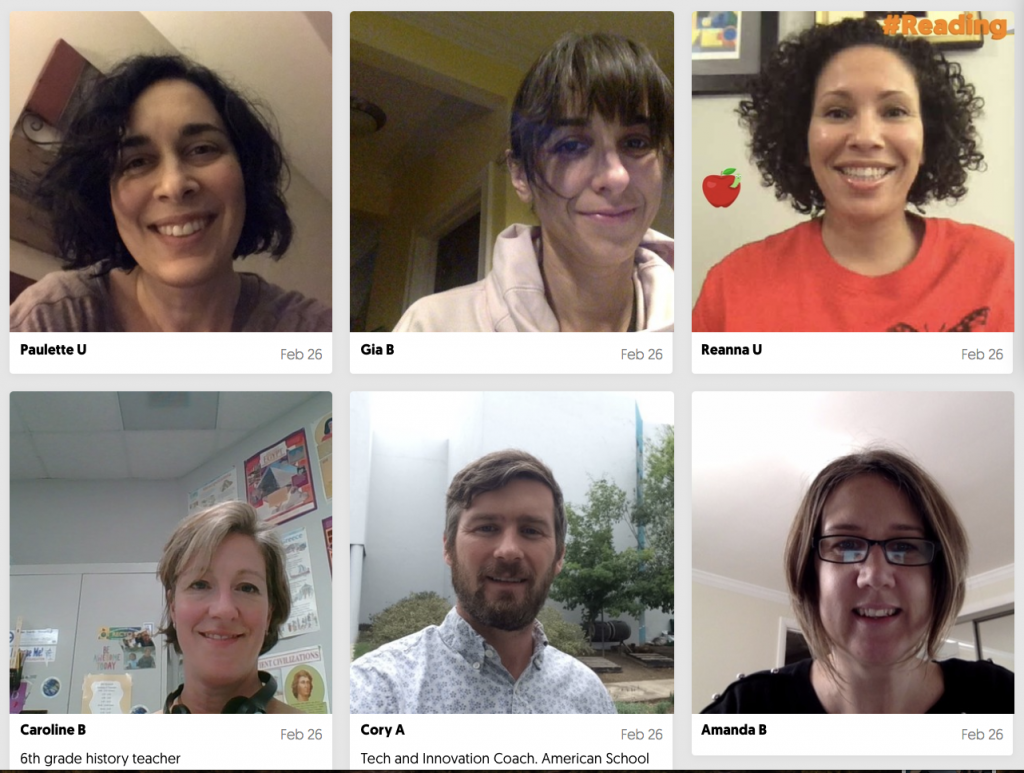35 Ideas and Resources for Learning Now
What do we know about learning now that demands we change what we do in schools?
Our team started with this question and designed an exploratory one-week professional learning pop-up course, Learning Now. The course generated 5000 pageviews, and had over 100 participants from 8 countries and 39 schools. The weeklong course generated participation in a Learning Now mural, videos, and discussions. We also culled many of the ideas and resources about learning now that participants enthusiastically shared with each other.
20 Recommended Resources for Learning Now
- Assessment, Choice and the Learning Brain (article). “The growing field of educational neuroscience, converging developmental psychology, cognitive science, and education, can help teachers and school leaders rethink how they approach assessments. While some of its initial findings merely support what educators have intuitively believed, it is also challenging many assumptions and providing new insight into best educational practices, especially regarding assessment.”
- Creating Cultures of Thinking: The 8 Forces We Must Master to Truly Transform Our Schools (book) by Ron Richhart. He outlines how any school or teacher can create a culture of thinking by leveraging 8 cultural forces: expectations, language, time, modeling, opportunities, routines, interactions, and environment.
- Drive: The Surprising Truth about What Motivates Us by Daniel Pink (book). This bestseller has implications for students around motivation in the classroom and beyond.
- OK Go TED Talk (video). The band OK Go on how to find a wonderful idea.
- Make Space by Scott Doorley and Scott Witthoft (book). This book chronicles the impact that the design of school spaces has on learning.
- Primary Source Analysis Tool (resource). Library of Congress primary source analysis for teachers and students conducting research.
- Small Changes in Teaching (article). Tangible and practical ideas about how small changes can have a big impact in classrooms and schools.
- Small Teaching: Everyday Lessons from the Science of Learning by James Lang (book). Improve student learning with a series of modest but powerful changes that make a big difference—many of which can be put into practice in classrooms.
- Sugata Mitra’s Hole in the Wall project and his Self-Organized Learning Environment project (SOLE). Mitra won a $1 million dollar TED prize for his ideas around promoting student-driven learning spaces.
- Switch: How to Change Things When Things Are Hard by Chip and Dan Heath (book). This book sheds new light on how we can effect transformative change across a diverse array of fields. Here is also a short video about Switch: The Elephant, The Rider and the Path – A Tale of Behavior Change.
- Ten Cornerstones of Cognitive Learning Sciences (article). Chris Sturgis of Competency Works does a fantastic job summarizing the latest research on cognitive learning science in a highly readable and short article.
- The Omega Institute (resource) offers excellent workshops and resources for K-12 mindfulness in education.
- The Learning Sciences: Two Perspectives (article). A short well written article about new advances in learning science. Must read!
- The Third Teacher (book) is also about how to design for learning in schools and classrooms. One participant mentioned the importance of wall spaces that show learning.
- The Way of Mindful Education: Cultivating Well-Being in Teachers and Students by Daniel Rechtschaffen (book). Great resource for educators looking for new ways to help students concentrate, learn, and thrive.
- Visible Thinking, Thinking Routines (resource). Tangible ideas for creating visible thinking routines in classrooms.
- Why Parents Should Support Student-Centered Learning (article). A piece for parents about student-centered learning with talking points for educators communicating with families. And an accompanying article 8 Things to Look for in a Student-Centered Learning Environment that has a checklist for parents when looking for student-centered learning environments.
15 New Ideas for Learning Now
We posted big questions around learning science, social and emotional learning, and learner-centered design in three different discussion rooms. We learned a ton from reading through participants’ ideas and questions. Here are just some of the ideas and questions that jumped out at us. Many of them will be applicable in your schools and classrooms.
Andrew Bevan, Collegiate School: “Explicitly teaching thinking routines has made my students better able to make the connections or ask the questions I have always hoped for. I particularly enjoy the structures of ‘see, think, wonder’ and ‘connect, extend, challenge’.”
Jim Burns, American School Foundation of Monterrey: “As a department, we have selected the C3 Framework – The framework is not focused on content, but on the process of inquiry with an essential element of ‘taking informed action’.”
Aubry Burr, Colegio Maya: “I am enjoying digging into different resources that help us look at how memory and the brain work with learning. I think it is important to take this into account as we design learning experiences for our students.”
Elizabeth Carmichael, Columbus Academy: “Learning today is not limited by the walls of the classroom. We are energized by different spaces.”
Liz Every, American School Foundation of Monterrey: “I often, as an introductory activity, ask my physics students to ‘play’ with some equipment I’ve put out. The 15-year-olds are pretty bad at it. They look for the instructions and tend to only do what they see others doing. Possibly because of a fear of failure (10 Key Learning Science Discoveries) or peer pressure issues, but also because I think they have forgotten how to ‘play’, or don’t associate the word with school. I believe that a lot of learning takes place during these preparation/play sessions where failure is an option, and that the final ‘presentation’ is not really the point.”
Laura Gellin, Park Tudor School: “I am not advocating to stop lesson planning, but I do wonder: how we can encourage ourselves and each other to be careful planners while also being flexible and more attune to spotting these opportunities? How can we re-train ourselves to prioritize the spontaneous moments for learning?”
Becky Green, Singapore American School: “How do we encourage students to do hard things? And how do we create a culture where we celebrate the discomfort and still allow it to happen?”
Jared Lister, Collegiate School: “A few years ago during my second trimester of teaching 7th grade English, I taped an index card to my lesson planner with the all-cap words ‘MAKE IT EXPLICIT.’”
Marsha Little, Lovett School: “What would our classrooms look like if we intentionally designed them to reflect our Vision for Learning (the document that speaks to our commitment to creativity, critical thinking, collaboration, communication)”?
T.J. Locke, Episcopal Academy: “Learning is powerful when students use new tools to discover new possibilities. I love it when teachers design learning experiences that push students cognitively, help them to harness the power of their own curiosity, and bring out the joy of discovery.”
Jen Neubauer, Nueva School: “It’s also my experience that students surprise us and inspire us when they have the freedom and power to direct their own learning experiences.”
Eric Nguyen, Noble and Greenough School: “Ask more open-ended questions, especially those to which there is no one right answer. Or, if there is one right answer, ask questions to which multiple solution methods exist. The assessment lies in how students craft and defend their outcomes/solutions.”
Katrina O’Connor, West Point Grey Academy: “Learning Now, in 2018, should not be about compliance and commodification of education; it needs to be about the intricacies of relationships with our communities, the world that is there to be explored, and the meaning-making we undertake.”
Reanna Ursin, The Westminster Schools: “I enjoy my role as a facilitator/guide/resource much more than the traditional role of gatekeeper of all knowledge. I regularly tell my students, “I can’t wait to see what you come up with!” They used to laugh, but now they know I’m being sincere; I don’t know how it’s going to turn out, but it’s always produced something interesting.”
Jason Yaffe, Greenhill School: “When students are given agency in the learning process and educators get out of the way to some degree, the learning takes off.”
For more, see:
- Four Takeaways for Rethinking School
- Four Design Principles for Introducing Mastery Learning
- Partnering with Students, Teachers, and Leaders at American International School Chennai
Global Online Academy (GOA) reimagines learning to empower students and teachers to thrive in a globally networked society. Professional learning opportunities are open to any educator. To sign up or to learn more, see our Professional Learning Opportunities for Educators or email hello@GlobalOnlineAcademy.org with the subject title “Professional Learning.” Follow us on Twitter @GOALearning. To stay up to date on GOA learning opportunities, sign up for our newsletter here.


